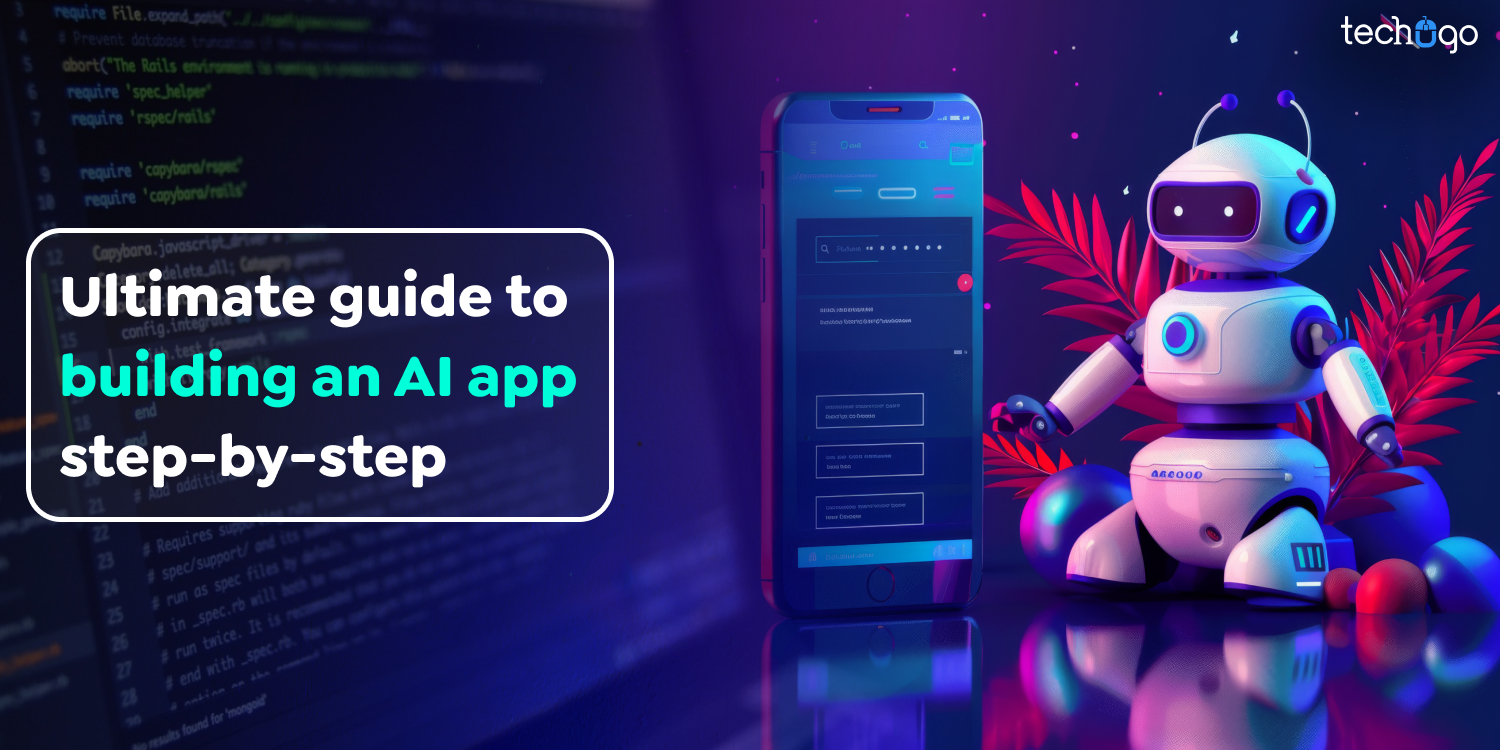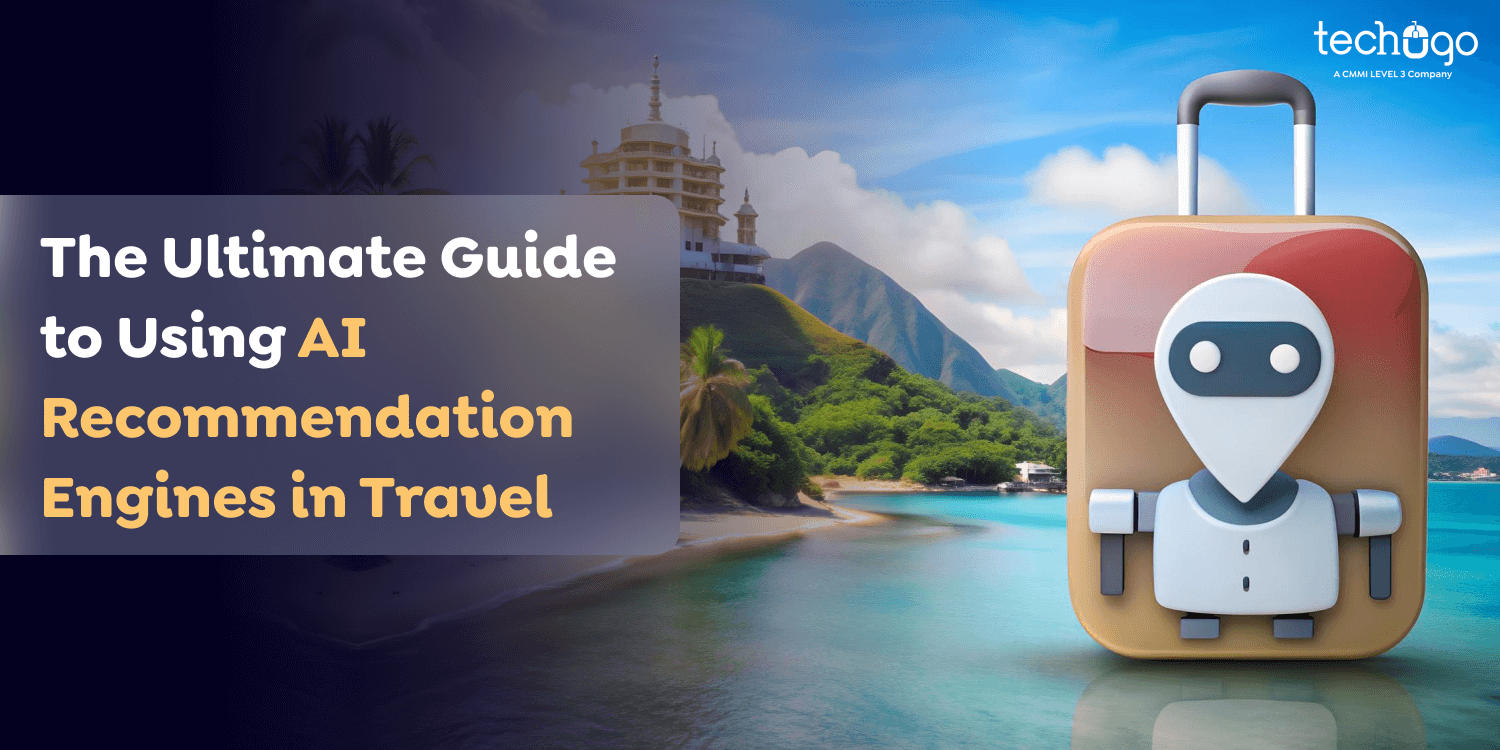14 Aug 2024
Updated on January 31st, 2025
How AI is Transforming Guest Experiences in the Hospitality Industry
Matthew Connor
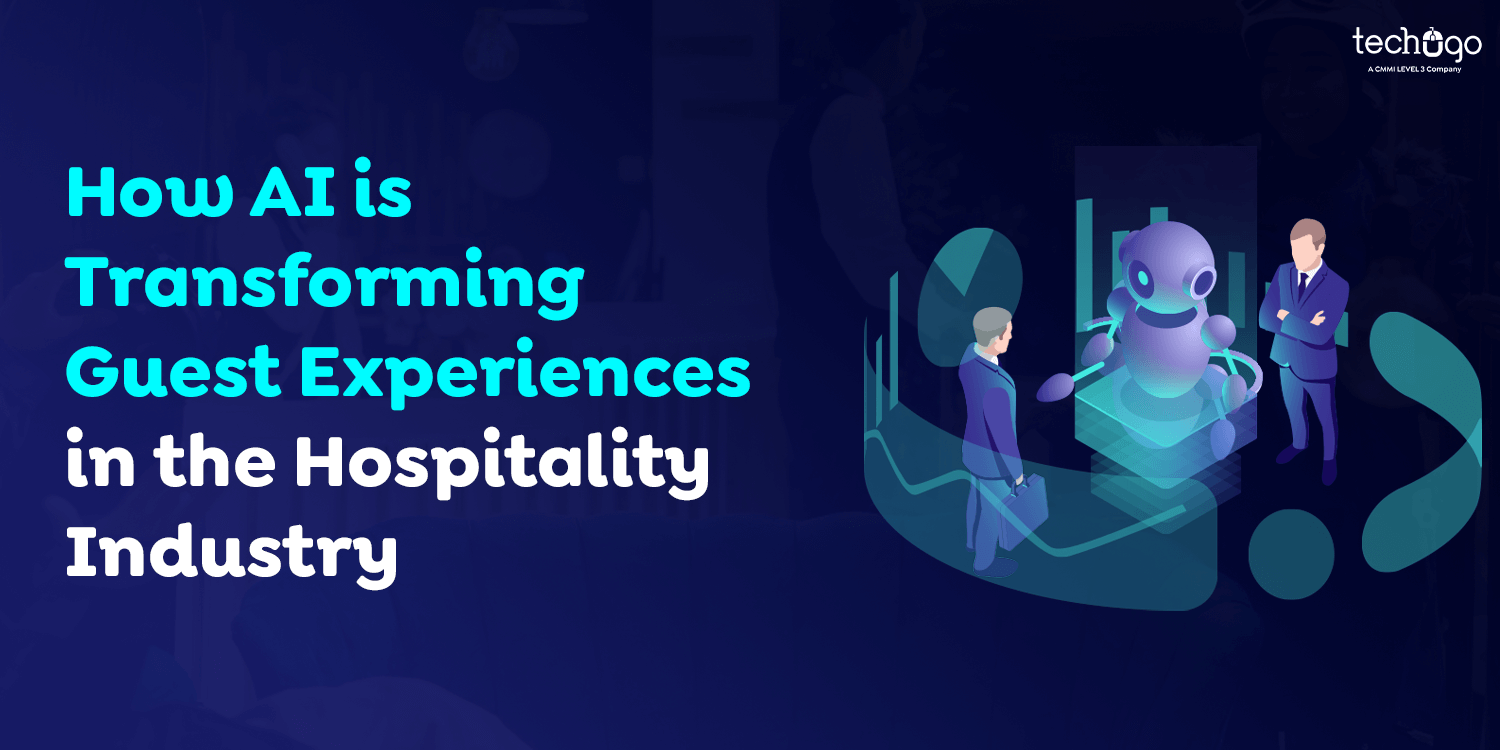
Technology in the hospitality sector is rapidly transforming with Artificial Intelligence. Significantly, as many as 69% of the industry respondents declared their companies’ plans to increase the relative tech budgets. Thus, leveraging such technologies for operational improvements and superior guest experiences in 2023. AI grants hotels the possibility of efficient solutions for management, guest interactions, and resources.
Also Read – Generative AI vs Predictive AI: Choosing the Right Technology for Your Business
Moreover, AI in hospitality industry will further enhance its impact on the development. Starting with the AI-powered predictive analysis that can guess what a certain guest would like to have next to the use of chatbots for immediate guest attention, AI is being incorporated into hotels to ensure guest satisfaction. In terms of service provision, AI technologies can learn from huge volumes of data in real-time. Therefore supports hotels to tailor services, optimize processes and increase revenues. Thus, further AI app development, as well as its implementation into hospitality operations does not only guarantee operational improvements. It also allows for even more target customer experience customized services setting new industry benchmarks.
Are you ready to dive in?
If yes, then let’s get started!
What is Artificial Intelligence (AI)?
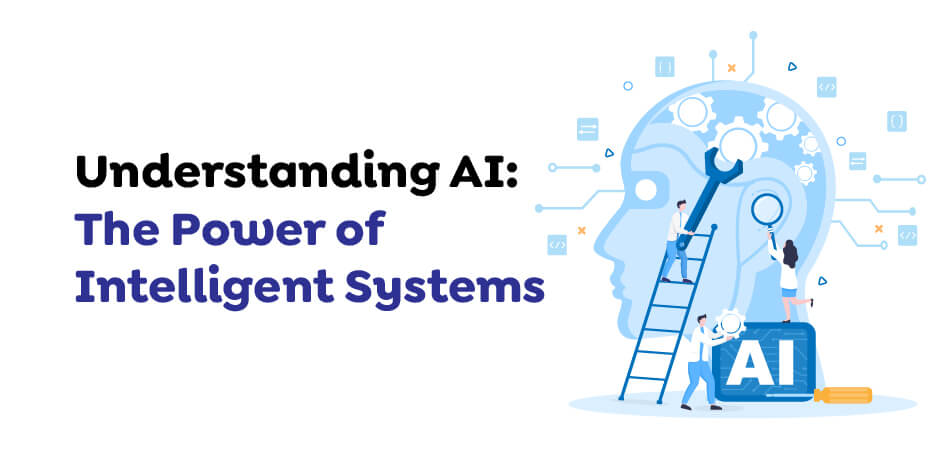
Artificial Intelligence (AI) refers to the ability of machines or computers to execute tasks traditionally needing human intelligence. The descriptive feature of AI lies in its ability to reason and take action towards specific purposes.
In the hospitality sector, AI is extensively applied, enhancing guest experiences, optimizing operational efficiency, and personalizing services. This technology’s swift progression has spurred the introduction of various AI applications tailored for hotels and resorts since 2022.
Now let’s discover the role of AI in hospitality industry.
The Role of AI in Hospitality Industry
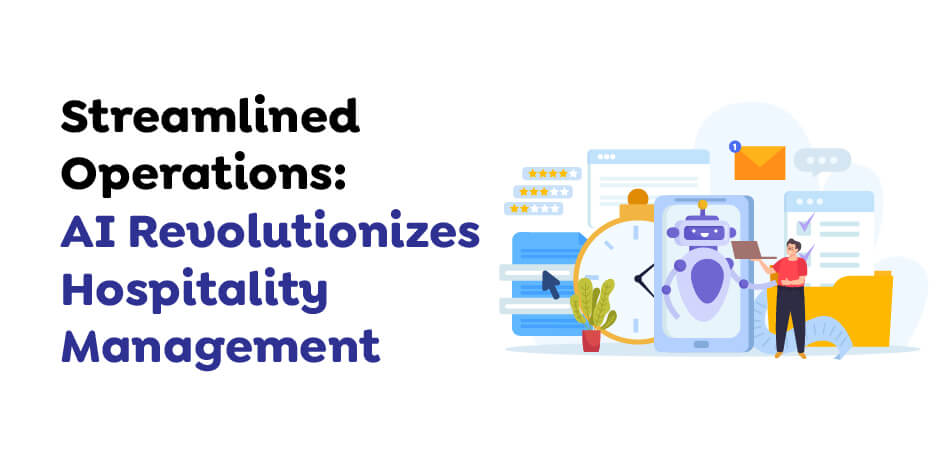
AI in hospitality industry is transforming significantly as it creates new levels of customer satisfaction and efficiency. When it comes to hotels and resorts, guests get their matters resolved through chatbots that are created using Artificial Intelligence. Moreover, guests can ask questions, make a reservation, or find information on where to go. These chatbots built by a hotel booking app development company employ NLP technology to identify and address the guests’ questions and inquiries promptly. Thus relieving the real staff from constant work and offering client services round-the-clock.
Further, AI-based algorithms in the hospitality industry are rapidly revolutionizing revenue management and pricing models. Algorithms referred to here help to scan large data to estimate demand to set prices that can be charged dynamically. This capability allows hotels to achieve high selling rates and income at the cheapest costs based on real market conditions. Business operations are also improved through efficiency by AI tasks such as scheduling cleaning services for the rooms. Additionally, stock management helps the personnel to provide adequate guest satisfaction services.
After learning about the role of AI in hospitality industry, now, let’s discover its top trends.
Top 10 AI Trends Shaping the Hospitality Sector in 2024
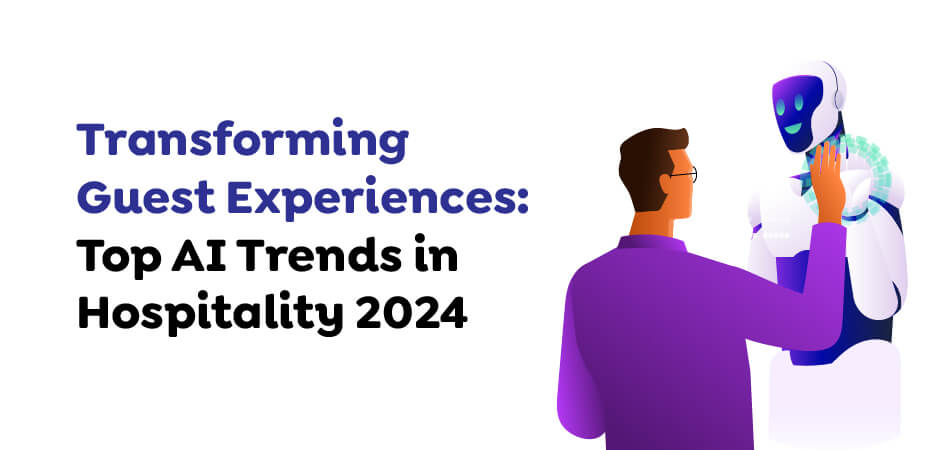
AI in hospitality industry is steadily entering and bringing significant changes in guest experience and organizational management. Choosing from preferred services, reducing harm to the environment, and the ability to run a hotel independently, all these are made possible by AI. This transformation’s top 10 AI trends in 2024 are as follows:
1. Personalized Guest Experiences with AI: Different opportunities are regularly showing that, through AI, hotels offer their guests incredibly personalized experiences employing harnessing data. Through analyzing the data collected from guests the hotels can predict how they will act and what they will want so as to satisfactorily provide them with amenities, room settings, and services. This kind of personalization benefits the hotel in the sense that the guests and repeat customers are encouraged.
2. Precision Automation in Hotel Operations: AI is driving automation in hotels, which, in turn, is enhancing the efficiency of administrative processes and also guest experiences. Voice recognition feature developed by a travel booking app development company in Canada for check-in and check-out or facial recognition for instant identification of guests. Moreover, intelligent assignment of rooms based on guests’ choices or predictive maintenance of hotel facilities are examples of how AI accelerates operations that are performed in the background. This increases efficiency and decreases operational expenses, negotiates mistake probabilities, and allows employees to provide guests with satisfying services.
3. Sustainable Practices with AI: It is noteworthy that sustainability strategies managed with an AI approach are gradually becoming an essential part of hotel operations. Occupancy is also used to regulate energy usage, room climate according to the guests’ preferences saves resources. Additionally, AI makes suggestions for sustainable behaviours and products.
4. Generative AI for Customized Guest Experiences: Another trend in the application of AI is to elevate the guest experience through the development of custom services. Through processing big data, generative AI can calculate or infer guests’ wants and expectations. Thus providing outstanding and unique services essential for hotels competing in the market.
5. Machine Learning for Dynamic Guest Interactions: With the help of machine learning, many guest touch-points from pre-arrival to post-stay surveys are being managed and enhanced. Using real-time data concerning guests’ behavior and preferences in their establishment, hotels can develop timely and relevant messages. Moreover, they can suggest interesting and relevant services and products, as well as mitigate possible concerns. They also foster a synergistic relationship which heightens the satisfaction of the guests while at the same time improving efficiency.
6. AI-Powered Customer Support: The usage of AI in chatbots has become the trending aspect of customer support in hospitality as they provide on-demand assistance and are available 24/7. Chatbots further allow accurate and fast responses in communication with guests due to the implementation of natural language processing. Thus, the human staff can be released from handling simpler requirements and can concentrate on promptly addressing guests’ specific requests.
7. Advanced Chatbots Enhancing Guest Engagement: With the help of chatbots powered by Artificial Intelligence, companies are further improving guest experiences. As it provides immediate conversation on the website and/or the application. Such chatbots can accommodate reservations and suggestions for nearby attractions. Also, providing responses to questions from the guests is a challenge that makes the hotels more convenient and useful for the guests and more efficient operationally.
8. Open-Source AI Partnerships: The openness of the solutions created through AI allows advancing and developing collaboration between the industry participants and has a positive impact on the hospitality industry. It allows the developers and the organizations to work collaboratively that enhance customer satisfaction and efficiency and optimise sustainability solutions. AI strategies allow equal use of complicated technologies, which creates a friendly environment for inventions.
9. Hyper-Personalization for Superior Guest Experiences: Hyper-personalization powered by AI features the application of Big Data to develop experiences that are personalized to guests’ requirements. With personalised room configurations, leisure services, and meals, hotels are in a good position to predict their guests’ necessities. Moreover, it provides services that will create satisfaction and brand loyalty.
10. AI-Driven Autonomous Operations: They are self-sufficient and can perform functions. It involves the efficient control of resources, control of inventory, and arrangement of the maintenance schedule in a hotel. These AI algorithms work on enhancing organizational productivity, cutting costs, and standardizing service delivery. Travel firms especially hotels would gain more time since most of their labour force would be engaged in meaningful activities. Additionally, it would develop competitive strategies necessary to attract the hotel’s guests in the ever-growing hospitality industry.
These AI trends represent a pivotal shift in how hotels operate and interact with guests, leveraging technology to deliver exceptional personalized experiences while improving operational efficiency and sustainability. As AI in hospitality industry continues to evolve, its impact on hospitality will be profound, setting standards for service and guest satisfaction.
Moving forward, let’s discuss about the benefits of AI in hospitality industry.
Transformative Benefits of AI Technology in the Hospitality Industry
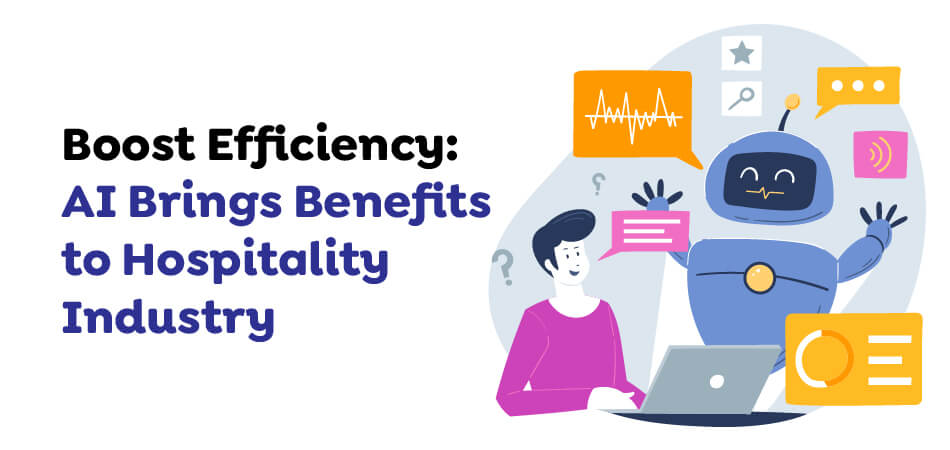
Discover how Artificial Intelligence is revolutionizing hospitality operations, enhancing guest experiences, and optimizing financial performance across hotels and resorts.
1. Improved Forecasting: AI as a technology indeed provides an environment that makes it possible for hotels to analyze historical and real-time data. Due to the analysis of bookings, customers, and seasons, as well as checking the impact of outside factors such as events or weather, AI can predict occupancy rates and revenue possibilities more accurately. This foresight helps the hotels to manage the prices appropriately and to benefit from the high demands. Finally, accurate forecasting assists the hotels in achieving the highest profits and productivity while avoiding problems such as over-booking.
2. Cost Reduction: AI in automation minimizes the need for employing manpower for activities like data input, bookings and responses to guests’ queries. If these routine tasks are automated, the expenses on human resources will be reduced, the work process will be accelerated. Thus the focus of employees will be shifted to those activities that can best be implemented with the use of human resources. In addition, through applying AI, the areas for cost savings can be identified throughout the company. It includes costs related to energy consumption, inventory control and others that affect cost reduction and the achievement of profitability.
3. Enhanced Productivity: From improving administrative tasks and overall business operations, AI can certainly increase productivity. Some of the essential organizational activities have been found to take a lot of time in an organization. However, with AI systems built by a food delivery app development company, these activities can be performed automatically. Automation accelerates organizational processes while eradicating inconsistencies to enhance operations and service delivery. Time-consuming operations can be managed by outsourced companies. Thus, employees can work to achieve the hotel’s objective of providing excellent customer service and working on core business strategies.
4. Improved Marketing Campaigns: AI revitalizes marketing tactics since enormous sets of data are processed to provide useful information about guest habits. To create market segmentation, machine learning algorithms may consider the guest’s age, usual booking and spending patterns, and online activity. This personalisation is important as it enables the hotels to reach the intended audience directly. Moreover, it also enables market content, special offers and related products that appeal to the personal interests of the guests for higher click-through rates. AI in hospitality industry also facilitates accurate price elasticity approaches that adapt to market changes. Additionally, also analyses competitors’ prices in an attempt to generate maximum revenue and marketing outcomes for the business.
5. Enhanced Customer Experience: The essence of using AI in hospitality industry pertains to the personalization of experience for the guests in the establishment. Accommodation providers are in a position to predict the needs of guests by applying artificial intelligence in processing guest data. AI brings significant benefits to the process of the guest experience by following each step: from check-in and service choice to the preferences concerning food and equipment in the rooms. Automated conversational interfaces, specifically NLP ones, improve companies’ client satisfaction. Moreover, they offer immediate assistance in case of questions and customization requests.
6. Advanced Revenue Management: AI enhances hotel business functioning by providing them with the advanced possibilities of Revenue Management by analyzing data. AI in hospitality industry can help in changing the price of the rooms based on the trends in bookings, competitors’ offers and demands. This strategy of pricing as a dynamic one, guarantees that the hotels are gaining the most possible amount of money during the high-demand season and, at the same time, remain competitive during the low-demand season. Furthermore, the analytical information derived through artificial intelligence also helps the hotels cross-sell products, to market-related products and services. Additionally, revenue prediction aims more accurately, hence helping to establish the service’s long-term financial viability.
7. Improved Safety and Security: Security, as part of AI technologies, plays its role in improving security features in hotels like surveillance systems and biometrics. It is possible to highlight that AI-enabled video analytics are capable of identifying trends, tracking people’s movements, and detecting possible security threats in real-time. Facial recognition technology also helps the guests in the fast and secure check-in and minimizes security risks by allowing only authorized people to check-in. Maintenance demands could also be forecasted from IoT devices and sensor data by applying AI algorithms. Through the use of AI in safety and security, the hotels enhance the safety of guests and the security of property.
Such advantages point out the social role of AI in hospitality industry and its ability to help hotels. It provides guests with the best experiences while managing costs effectively and ensuring growth in a rather saturated market environment.
Now, let’s explore how much does it cost to develop an AI app for the hospitality industry.
Also Read – How does React Native contribute to reducing mobile app development costs?
Cost Considerations for AI Development in the Hospitality Industry
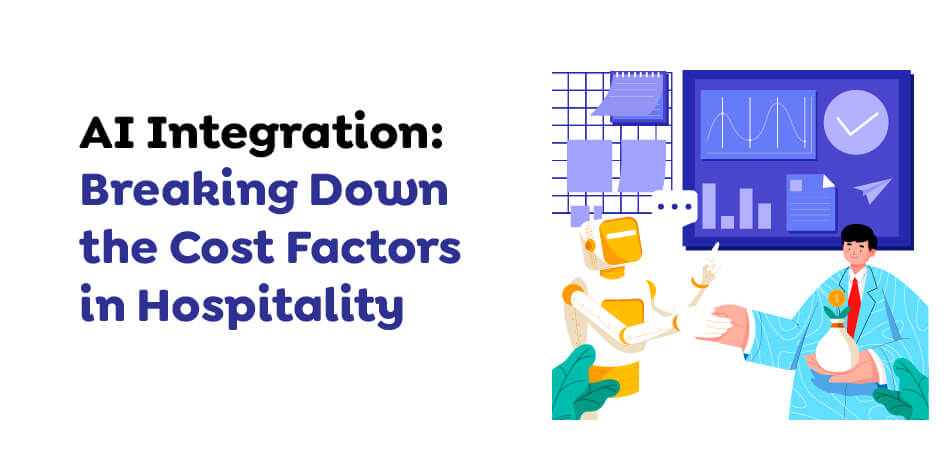
The employment of AI in hospitality industry has many cost factors that are outside the development stage.
-
Development and Integration Costs
It involves spending on AI software solutions for specific industries, building AI models, and interface with the hotel’s IT systems. In this phase, the potential talent that can be recruited includes AI developers to develop a solution which addresses the organization’s needs.
-
Infrastructure and Hardware Requirements
AI often needs specific hardware components for managing the data as well as for the training of an AI model. These costs may include; purchasing servers for the accommodation of guests’ data, cloud solutions for scalability and storage solutions for large numbers of data generated by guests and the operational business.
-
Training and Data Preparation
AI models’ training remains a challenge due to the need for quality, and timely data related to hospitality services. Expenses such as data scraping, preparation and coding are crucial to get the right outcome from using AI systems. Moreover, continuous inclusion of new data and maintenance updates in the models is required to use AI models for carrying out ventures successfully and efficiently in the long run.
-
Maintenance and Support
Subsequently, the functions that are most important to ensure are those related to post-deployment support and maintenance, issues regarding bugs, updating the AI algorithms, and compatibility with other systems. Others can be regular update charges and technical assistance in case of any challenge in the program’s working.
-
Compliance and Security Measures
Data protection and security measures for the data gathered and used in the development of AI in hospitality industry must be strictly followed. Some expenses may be identified as protecting a guest’s personal information and other operation data. It includes putting into practice encryption methods, safeguarding the data, and engaging in security assessments frequently.
-
Training and Adoption Costs
It is crucial to note that organizational capacity and readiness are critical to the efficiency of AI in hospitality industry. Hence, it is imperative to train the staff on how to use these AI tools and systems in their work. Efforts related to conducting training programs and redesigning work processes to incorporate AI solutions should also go into the cost.
Also Read – Explore How AI in Banking Transforms Customer Service and Security
Why Choose Techugo for AI Solutions in the Hospitality Industry?
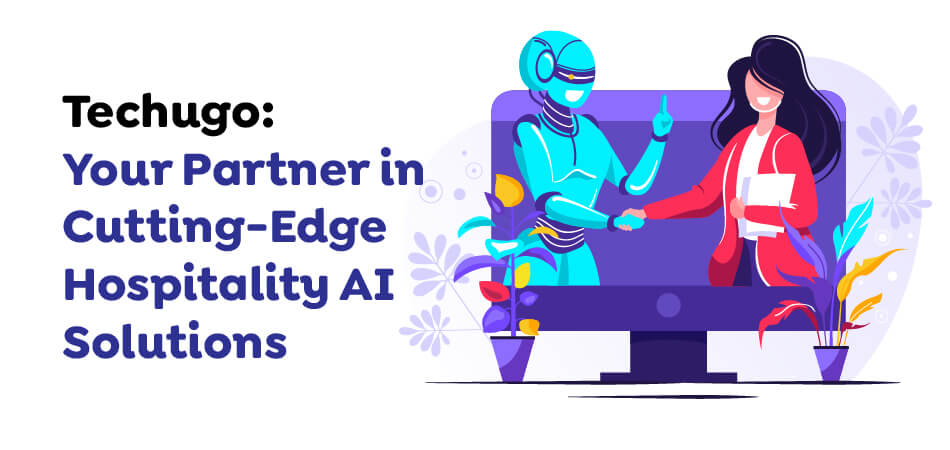
Choosing Techugo for the implementation of AI in hospitality industry is an important step based on the company’s focus on niche trends. Techugo’s AI expertise ranges from creating custom solutions to exclusively addressing various issues connected with the hospitality industry. Techugo has experience in creating AI solutions for various firms with interactions like chatbots. Moreover, using AI to predict the results of the company’s retribution and using data for visitor satisfaction improvement.
The thing that separates Techugo, a mobile app development company in Canada from other companies is that it wants to be an innovational and high-quality one. Combined with the emphasis on developing, creating and implementing ready and effective AI-driven solutions, services of maintenance is the goal. This approach guarantees that the AI solutions delivered by Techugo do not only improve the business performance. It also increases guests’ satisfaction but also drives business development in the context of the changes in the hospitality industry.
In A Nutshell!
In conclusion, Artificial Intelligence (AI) is set to become the new frontier in the development of hospitality and guest experience. AI solutions are at the core of the organizations’ most dynamic and fast-growing sectors as diverse as predictive analytics. Thus using AI in hospitality industry can enable hotels to better identify guests’ requirements more effectively allocate resources and improve services. Besides benefiting operational workflows, budgets, and calendars. It also creates a tailored and smooth encounter for guests, which is imperative for sustaining market viability in today’s market.
Considering the future developments, the further improvement of AI seems to carry even more potential within the hospitality industry with regards to increased individualisation, improvements in environmentalism, as well as improved expansive optimisation. While applying AI to the company’s plans presupposes several challenges, cooperation with an experienced partner like Techugo, an entertainment app development company becomes highly beneficial. Such alliances help to guarantee that hotels achieve maximum benefits from the continuous and active application of AI technologies, as well as follow the further trends of the industry and become leaders in the development of customer satisfaction and profitability.
Get in touch with us today to begin a journey towards digital transformation and excellence together.
Get In touch
We are excited to here from you and let’s start something special Together. Call Us for any inquiry.
Write us
sales@techugo.caJust a call away
About you

